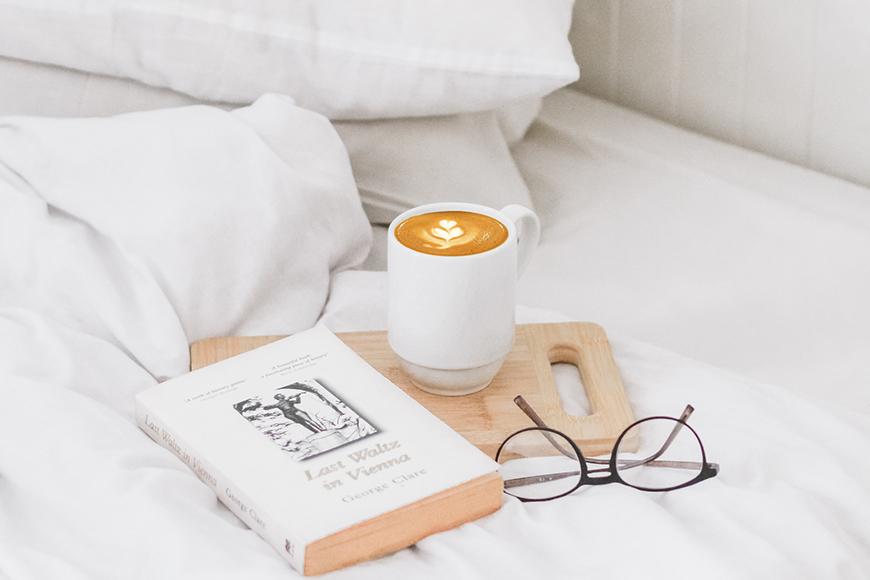
When night falls, you get into your pyjamas, set up your alarm, and hop into bed. You get situated into the optimal sleeping position and close your eyes, ready to fall into dreamland. But, much to your demise, nothing happens. Instead, your mind wanders and you start thinking about what you have to do tomorrow. This thought leads to another, and suddenly you recall that one time in grade two, where you tripped and fell in front of your entire class.
For the longest time, I was that person who would try to go to bed early but would have the hardest time shutting off my brain and falling asleep. It felt like my bed was a breeding ground for overthinking. It wasn't until I started incorporating a before-bed routine that I was able to fall asleep with a clear mind and get a sufficient amount of sleep.
If you're struggling to fall asleep and go to bed with less stress, here are five things I do to help me feel relaxed and at ease:
1. Shut off Your Phone an Hour Before Bed
Did you know that the blue wavelength light from LED-based devices such as your phone, laptop, and tablet increases the release of cortisol in the brain? Cortisol is a hormone that is released during moments of stress, which can make your body more alert to its surroundings. When this hormone releases into our bodies, it inhibits melatonin production. In other words, the production of the hormone that helps you sleep (melatonin) is slowed down. To make sure your body is producing melatonin, the National Sleep Foundation recommends that you put your phone away an hour before you go to bed. Doing this is an easier thing said than done, especially during times like this, where we rely on our electronic devices to stay connected. To hold myself accountable, I set a reminder on my phone to set tomorrow’s alarm and go to bed. Over time, this has allowed me to be more mindful of my overall phone usage at night.
2. Make Tomorrow's to-do List
One of the main things I think about when I go to bed is what I need to do tomorrow. It’s moments like this where I feel the most stressed out while in bed. To avoid this, I grab my bullet journal right before I go to bed and write out the things I need to do the next day. During this time, I allow myself to efficiently plan out the following day. This gives me the confidence to tackle the coming day. Making lists can be powerful, as it enables you to sort through your thoughts and create a concrete plan, which can encourage you to be more productive the following day.
3. Do a Relaxing Activity
After a long day, it's nice to end it by doing a relaxing activity. I like to take time out of my evening to either bullet journal or listen to music, as I find that these two activities make me feel happier and more relaxed. But we're all different. From painting to listening to music to watching your favourite Netflix show, we all de-stress in different ways. Try finding an easy activity and stick to it every day. The activity you choose shouldn't feel like a chore, but more so something fun that you enjoy doing.
4. Take Five Minutes to Meditate
Meditation is something I have incorporated into my bedtime ritual for over a year now, and I can say it has made an enormous difference in my overall mental well-being. Research has shown that meditation has played a prominent role in reducing stress, improving sleep, and increasing focus. There are several free resources out there that can help you get started with meditating. My personal favourites are apps like Headspace and Calm, as well as Health & Counselling Services' guided meditation recordings.
5. Take Time to Reflect Upon Your Day
Taking five minutes to reflect upon your day can be a very therapeutic process. It gives you a chance to take a step back and examine your day. A tool I've been using to do so is the Five-Minute Journal, which has an evening component where you write about three good things that happened during the day, as well as one thing you could have done to improve your day. Writing out these thoughts has allowed me to be more mindful and go to bed feeling refreshed. If you don't have the Five-Minute Journal, no problem! You can grab any notebook to keep your end-of-day log. This entire process allows you to feel more positive about your day, and it allows you to let go of any thoughts you may have been holding in.
Another activity I enjoy doing in the evening to reflect on my day is keeping a gratitude jar. Gratitude involves noticing, appreciating, and being thankful for the things of value in your life. If you're interested in starting your own gratitude jar, write one thing you are grateful for on a piece of paper and place it in the jar. The best part of having a gratitude jar is that you can look back on what you have written whenever you need a pick-me-up.
It can be difficult to shut off our brains, especially during a pandemic. It's at times like this where it's necessary to take care of ourselves and get enough sleep so that we can tackle what is next to come. I hope the tips that I have shared allow you to move forward with creating the optimal bed-time routine, and that it encourages you to take care of yourself.














